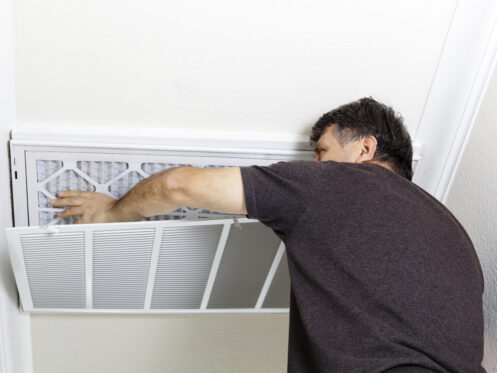Air filters serve an essential role within your Greensboro, NC, home. These filters help remove airborne particles from circulating throughout your living space, and they also protect your heating and cooling equipment from excess accumulation of dust and debris. Functional air filters are crucial for the smooth operation of HVAC appliances like air conditioners, heat pumps, and furnaces. According to the Environmental Protection Agency (EPA), indoor air is up to five times more polluted than the air found outdoors. This means that you must have proper components, like clean air filters, in place to guarantee sufficient performance. A look at the top advantages of clean air filters can help you make the right maintenance choices for your home.
What Are Different Types of HVAC Filters?
Filters vary in size and style, and compatibility depends on the specific model that you own. You can consult the manufacturer’s guidelines for your appliance, and our qualified HVAC team can also provide recommendations on choosing the correct filter size and format.
Common types of filters include fiberglass, pleated, or high-efficiency particulate air (HEPA) filters. Fiberglass filters are usually 1-inch thick and made of woven material. They are popular for their versatility, but they can also require replacement every 30 days. Pleated filters are made of polyester or similar materials. They are designed to increase efficiency through an increased surface area.
If your HVAC unit is compatible with an electrostatic filter, plan to clean or replace the electrostatic filter every one to three months. An HVAC professional can also clean them during maintenance sessions. HEPA filters are advanced devices that remove up to 99.97% of airborne particles that are 0.3 microns (µm). These contaminants may include dust, pollen, mold, and certain types of bacteria. While effective, HEPA filters are often too restrictive for use in a traditional HVAC system.
In addition to the specified type, each HVAC filter also has a minimum efficiency reporting value (MERV) rating. The higher the MERV rating, the better the filter becomes at trapping certain kinds of airborne particles. However, very high MERV ratings may be too restrictive, resulting in frequent repairs and a shortened lifespan of your heating and cooling equipment.
Benefits of Keeping Your HVAC Filters Clean
Even if you have the correct size and type of filter, it is important to keep your HVAC filter clean. Primary reasons for maintaining a clean HVAC filter include reduced energy consumption, better air quality, efficient temperature control, and improved HVAC life expectancy.
1. Reduce Energy Consumption
Dirty or clogged HVAC filters impede proper airflow within your heating and cooling systems. This obstruction can cause the HVAC unit to work harder to complete performance cycles. As the appliance works harder to do its job, it draws more power. This extra power usage can cause an unwanted spike in utility bills. In contrast, keeping your filter clean can reduce unnecessary energy consumption. According to the U.S. Department of Energy (DOE), replacing a dirty filter can reduce excess energy usage by up to 15%.
2. Improve Indoor Air Quality
Once an HVAC filter becomes clogged or dirty, it can no longer effectively remove airborne particles from the air. These contaminants will stay in your home until you replace the dirty filter with a clean one. According to the EPA, airborne particulates can compromise air quality and have both short-term and long-term effects on your health. These effects can range from allergy symptoms to serious problems like respiratory infections.
3. Lower the Risk of Mechanical Breakdown
HVAC systems with dirty filters must work harder to push air through the system. This can put undue wear and tear on your equipment and may increase the likelihood of breakdowns. Dirty filters can also allow dust or grime to accumulate on system components and cause additional problems. For example, a dirty filter can allow dust to accumulate on your unit’s evaporator coils. This can hamper the coils’ ability to absorb heat and lead to mechanical failure. Similarly, dust buildup can cause the blower motor to overheat and result in costly repairs. Reduce the odds of unplanned service calls or emergency repairs by keeping your HVAC filter clean.
4. Improve Temperature Control
HVAC filters play a key role in temperature regulation. Since a dirty filter restricts airflow, conditioned air will have a harder time flowing from the unit and reaching individual rooms. Keeping your filter clean enables treated air to easily pass through your unit and ductwork, thereby helping the system maintain stable internal temperatures within the home.
5. Help Prevent Mold
Along with catching dust and debris, clean filters also help trap mold spores found circulating in indoor air. This helps prevent the spores from settling on surfaces and leading to further mold growth. When a filter is excessively clogged, however, the spores can settle in damp or dark spaces like your air ducts and result in the spread of mold. In addition, a clogged filter itself can become a site of mold growth if exposed to mold growth or excess humidity. Switching out your HVAC filter is one of the simplest ways to prevent this occurrence.
6. Boost HVAC Safety
Household safety is another important reason to keep your HVAC filter clean. When a filter becomes too clogged and restricts airflow, the filter itself could become lodged in the HVAC system. There may also be an increase in pressure within the system. This can cause parts of the system to overheat due to compromised air flow. This can increase your risk of a house fire or system failure.
7. Reduce Accumulation of Dust
Dust is a combination of fine particles like dirt, soil, and dead skin cells. These particles settle on carpets, upholstery, countertops, etc. Too much dust can damage belongings, like electronics. Because dust particles are small, they are also easy to inhale and can cause problems within the lungs and respiratory tract. Clean HVAC filters can trap excess dust so that it stops circulating through your home. Not only is this beneficial for your health, but it also protects your HVAC system and keeps your home clean.
8. Extend Your HVAC System’s Lifespan
HVAC units are significant household investments intended for years of use. When these appliances overwork due to excess debris buildup, the strain can shorten their life expectancy. By changing the filter on a regular basis, you can protect internal components and help the HVAC equipment live up to its full potential.
Contact Us Today
Clean air filters can help maximize the performance of your heating and cooling equipment. If HVAC filter requirements seem overwhelming, there is no need to panic. Aurora Pro Services Heating, Air, Plumbing, Electrical, & Roofing provides HVAC services for homes in Greensboro and the surrounding areas. Our technicians offer AC installation, inspection, and maintenance of all heating and cooling equipment as well. We can identify issues with air conditioners and mini-splits and provide troubleshooting for issues with your furnace or heat pump. In addition, we can install HEPA filters with the correct MERV rating and resolve any problems with air ducts. Contact Aurora Pro Services Heating, Air, Plumbing, Electrical, & Roofing today for all your HVAC needs.






